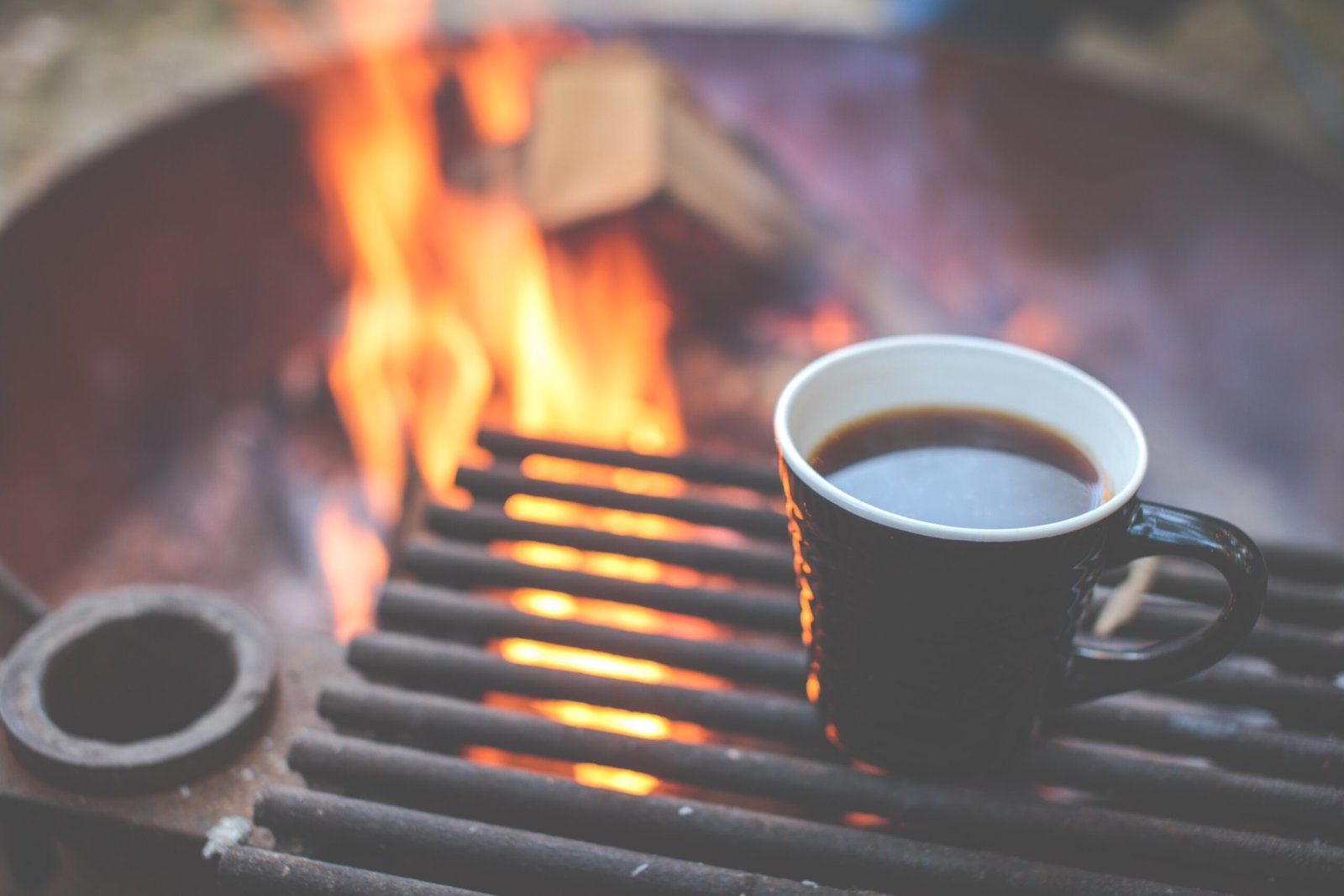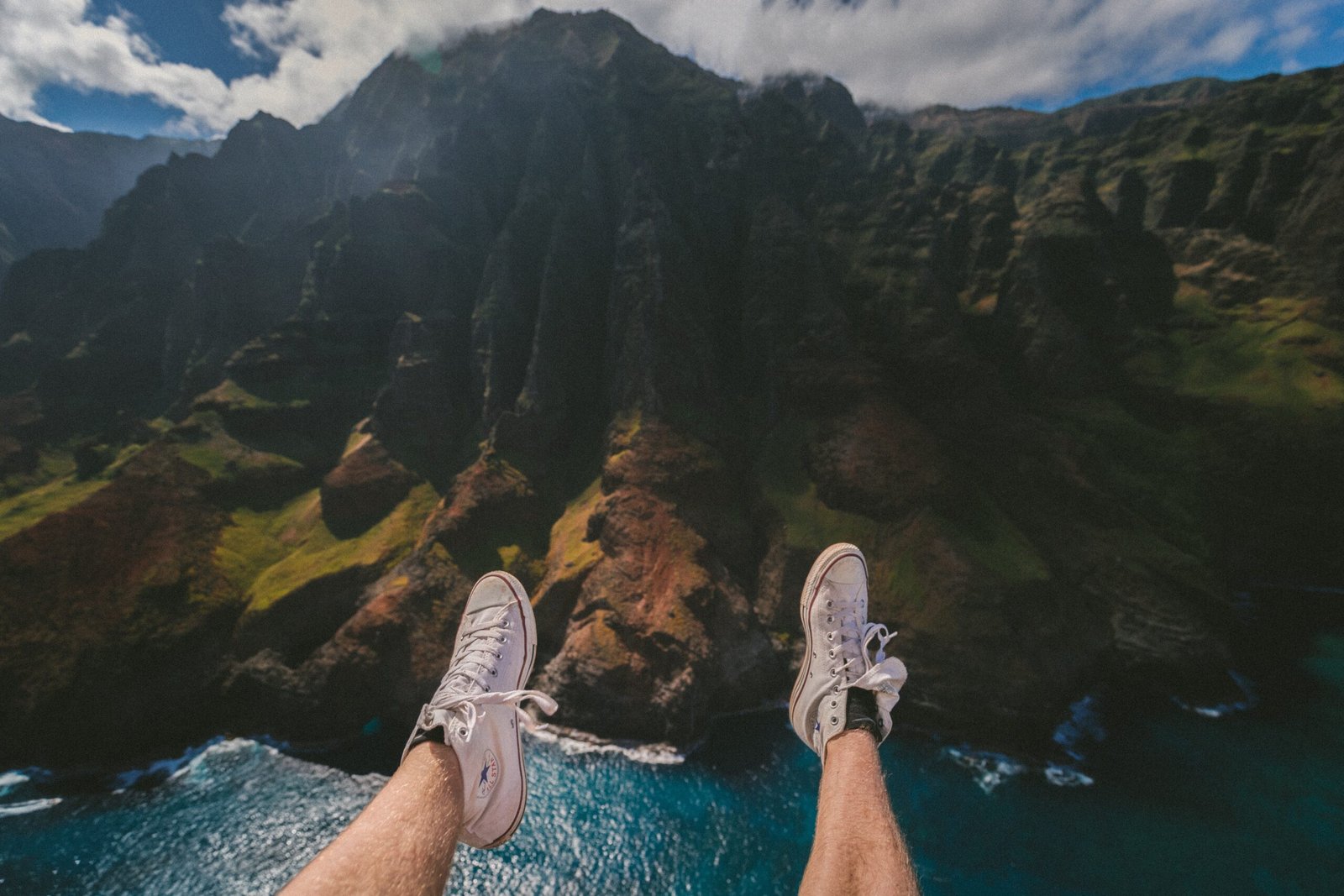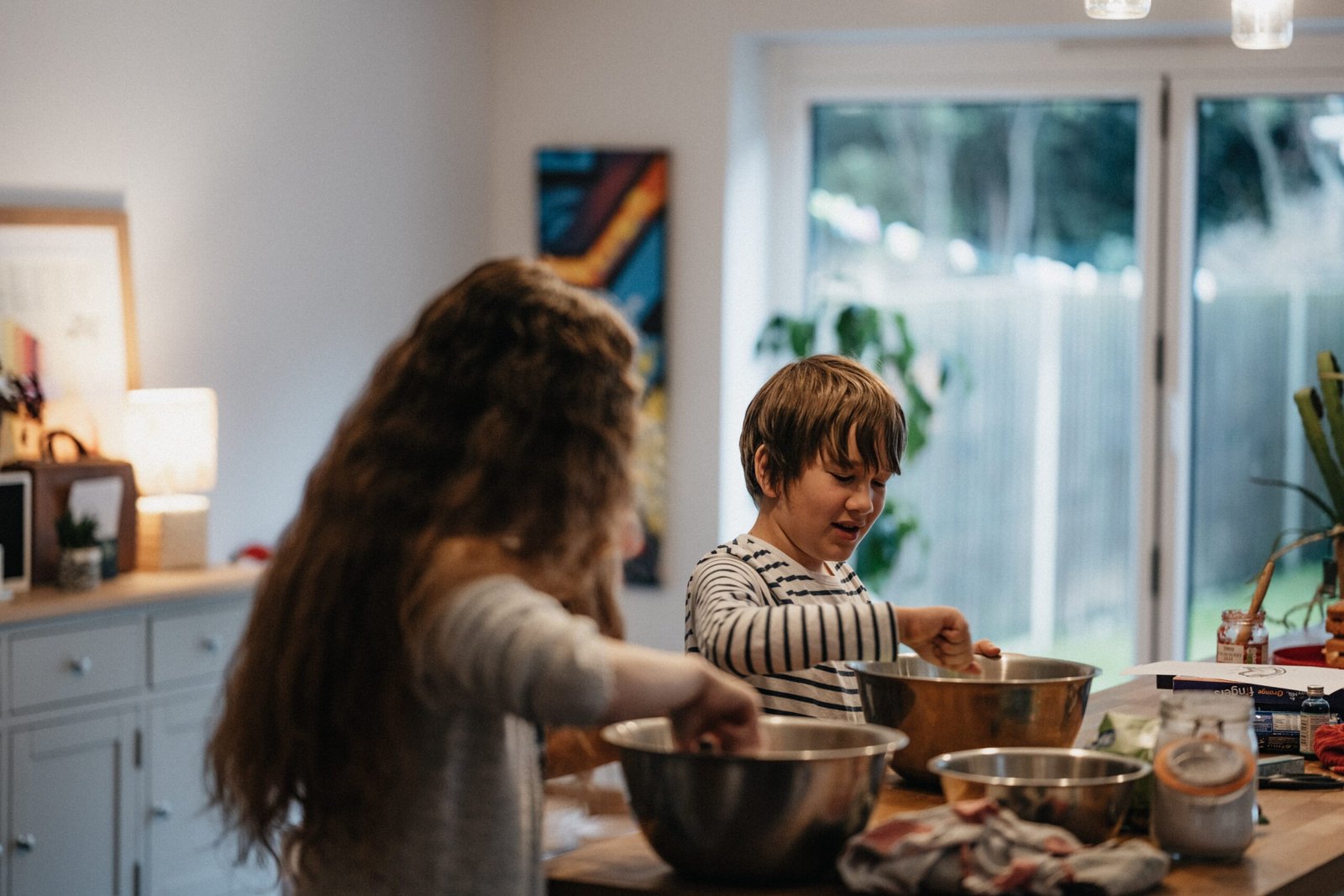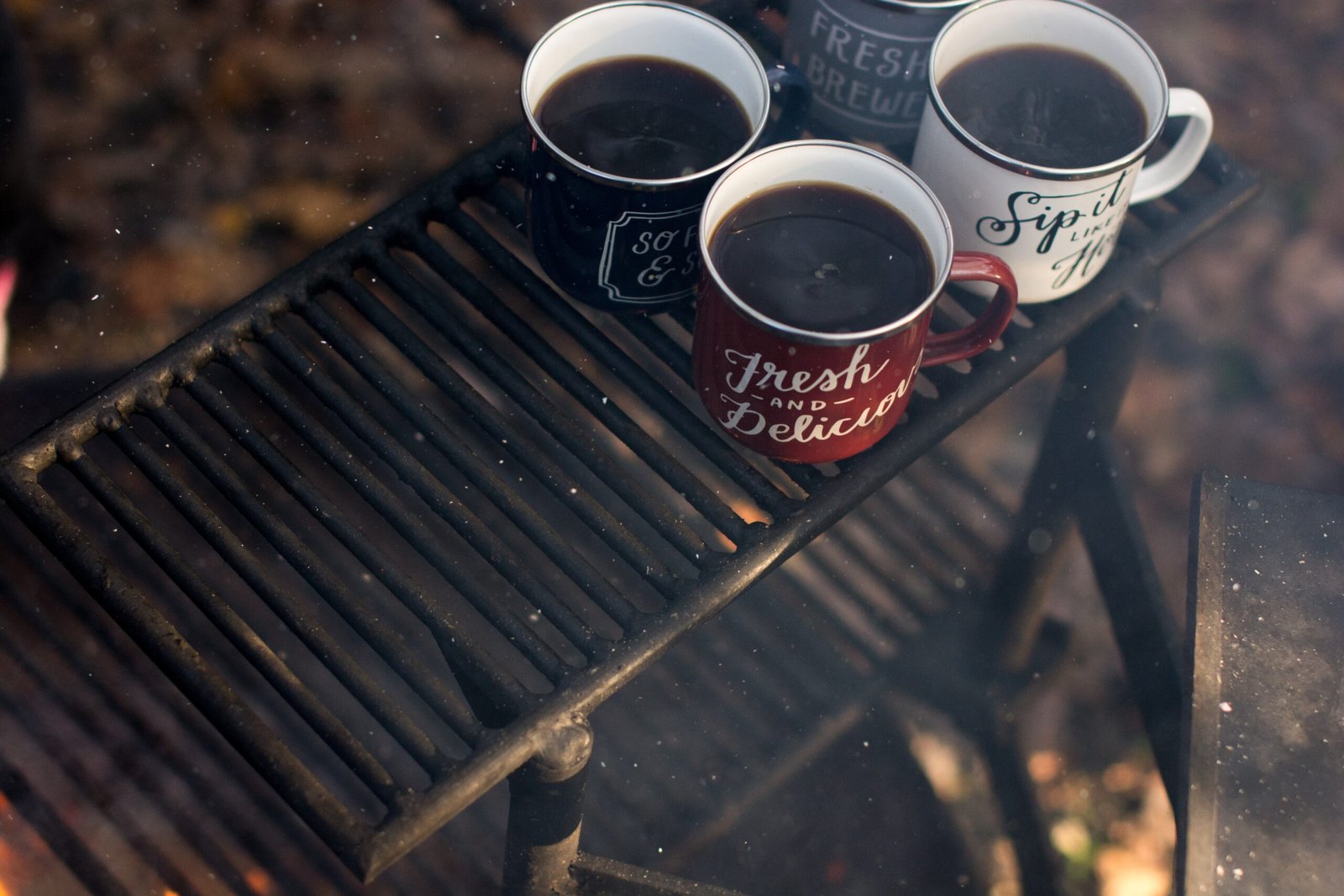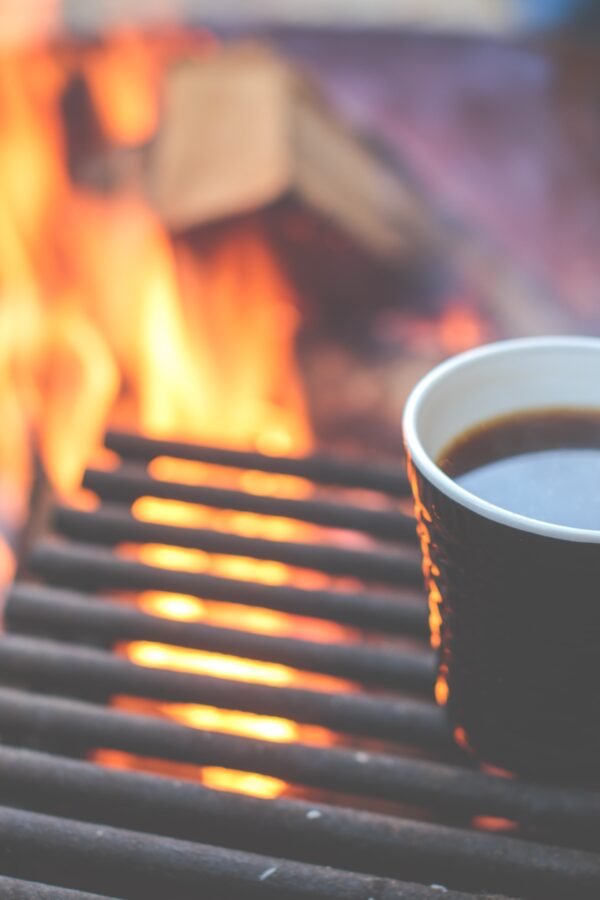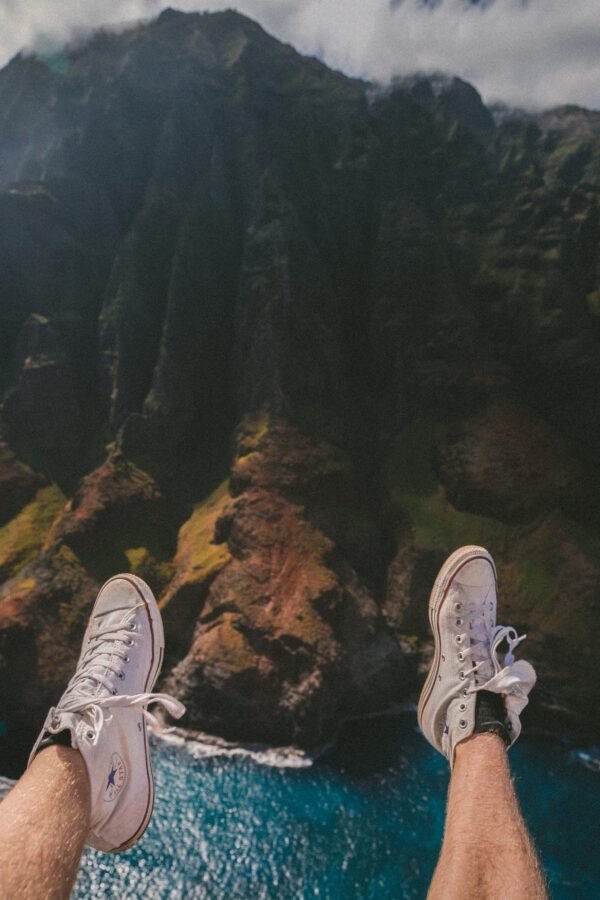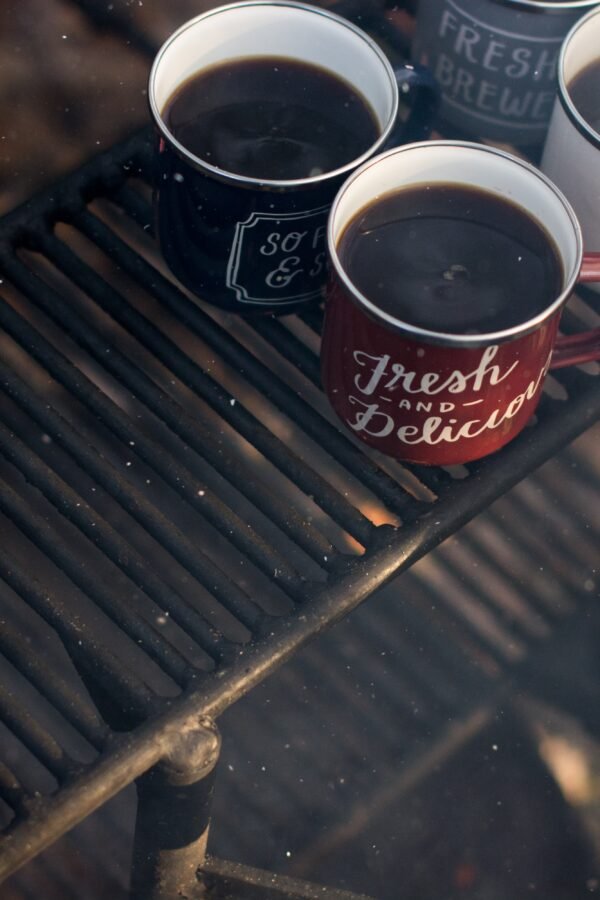Heading out on a camping trip soon? Look no further for all the essential items you need to pack! Whether you’re a seasoned camper or a beginner, packing the right gear can make all the difference in ensuring a comfortable and enjoyable outdoor adventure. From tents and sleeping bags to cooking utensils and bug spray, this article will provide you with a comprehensive list of must-have items for your camping trip. So grab a pen and paper, because you’re about to be prepared for the great outdoors like never before!
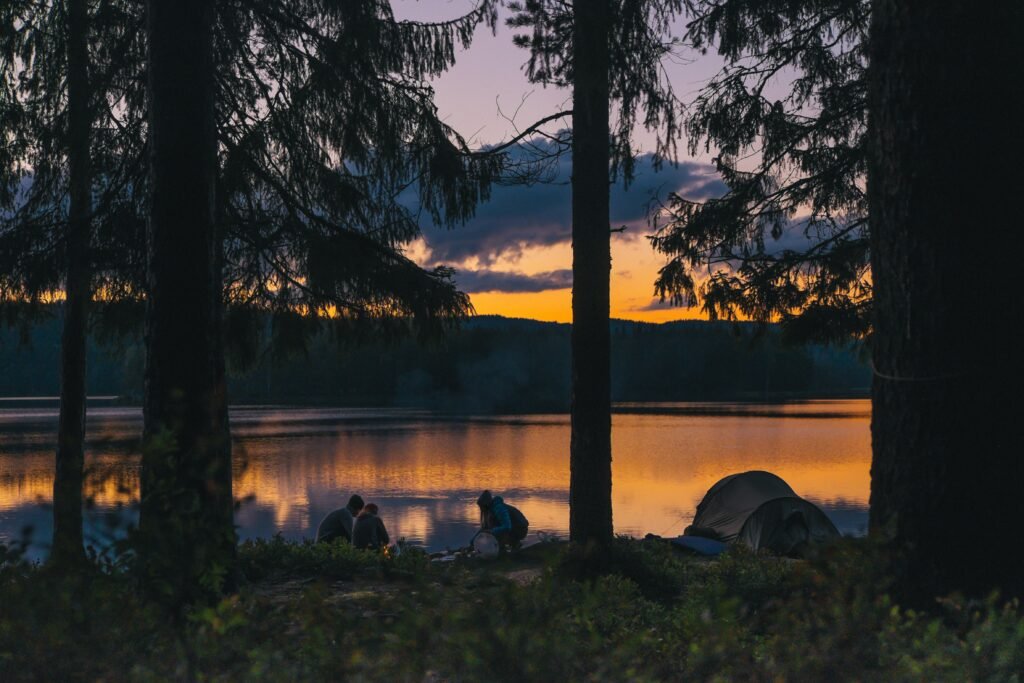
Clothing and Footwear
Layers for all weather conditions
When packing for a camping trip, it’s important to be prepared for all types of weather. By layering your clothing, you can easily adjust to changing temperatures. Start with a base layer made of moisture-wicking material to keep you dry. Add a mid-layer for insulation, such as a fleece or down jacket. Finally, pack a waterproof and windproof outer layer to protect you from rain and gusty winds. By having these layers, you can stay comfortable no matter the weather.
Durable and comfortable hiking boots
A good pair of hiking boots is essential for any camping trip. Look for boots that are durable and offer good ankle support. They should be waterproof to keep your feet dry in wet conditions. Additionally, they should have a good grip on the soles to prevent slipping on slippery surfaces. Make sure to break in your boots before your trip to avoid blisters and discomfort while hiking.
Rain gear
Don’t let rain dampen your spirits during your camping trip. Pack a high-quality rain jacket and waterproof pants to stay dry when it’s wet outside. Choose gear that is breathable to prevent you from getting sweaty and uncomfortable. Additionally, bring along a waterproof cover for your backpack to protect your belongings.
Swimsuit
If you’re camping near a lake, river, or beach, don’t forget to pack a swimsuit. Swimming can be a fun and refreshing activity during your camping trip, so make sure to bring a suit that you’re comfortable in. You can also use your swimsuit as a backup set of underwear if needed.
Hat
Protect your face and head from the sun by bringing a hat. Opt for a wide-brimmed hat that provides shade to your face, neck, and ears. This will help prevent sunburns and keep you cool on hot and sunny days. Additionally, a hat can be useful during light rain showers to keep water out of your face.
Socks and underwear
Pack enough socks and underwear for the duration of your camping trip. Look for moisture-wicking socks to keep your feet dry and prevent blisters. For underwear, choose comfortable and breathable options. It’s always a good idea to pack a few extra pairs in case of unexpected mishaps or if you want to change into fresh clothes.
Sleepwear
Having comfortable sleepwear is important for a good night’s sleep while camping. Choose sleepwear that is appropriate for the weather conditions, whether it’s warm pajamas or lightweight sleeping clothes. Consider bringing warm socks and a beanie to keep you cozy on colder nights.
Food and Cooking
Non-perishable food items
When it comes to camping food, it’s best to pack non-perishable items that don’t require refrigeration. This includes items like canned goods, dried fruits and nuts, granola bars, instant noodles, and peanut butter. These foods are easy to pack and can be enjoyed without cooking if necessary.
Cooler and ice packs
If you plan to bring perishable food items or want to keep your beverages cold, a cooler and ice packs are essential. Look for a cooler that is large enough to hold all your food and drinks and has good insulation. Pack the cooler with ice packs to keep everything chilled. Try to keep the cooler in the shade to maintain the temperature for longer.
Cooking utensils
To prepare and cook your meals while camping, you’ll need a set of cooking utensils. This includes a spatula, tongs, a can opener, a knife, and a pot or skillet. Opt for lightweight and durable utensils specifically designed for camping to make cooking easier and more efficient.
Stove or grill
Depending on your camping style, you may choose to bring a camping stove or a portable grill. Both options allow you to cook your meals outdoors. A camping stove is compact and easy to set up, while a portable grill gives you the option to grill your food, adding great flavor to your camping meals. Make sure to bring enough fuel or charcoal to last your entire trip.
Firewood or charcoal
If you plan to have campfires during your camping trip, you’ll need firewood or charcoal. Firewood can be collected at the campsite if permitted, or you can purchase it locally. Charcoal is a convenient option for cooking on a portable grill. Make sure to follow all fire safety regulations and guidelines provided at the campsite.
Marshmallows and skewers
No camping trip is complete without roasting marshmallows over a campfire. Pack a bag of marshmallows and some skewers to enjoy this classic camping treat. You can also get creative and bring along some chocolate and graham crackers to make delicious s’mores.
Reusable water bottles
Staying hydrated is crucial while camping, so don’t forget to pack reusable water bottles. Opt for ones that are durable and can withstand outdoor activities. Make sure to fill them up with water before starting your trip and refill as needed. This helps you avoid using single-use plastic bottles and keeps you hydrated throughout your adventure.
Shelter and Sleeping
Tent or camping hammock
Choosing the right shelter is important for a comfortable and enjoyable camping experience. If you prefer traditional camping, a tent is a must. Look for a tent that is easy to set up, spacious enough for your needs, and made of durable materials. For those seeking a more unique camping experience, a camping hammock can provide a lightweight and comfortable alternative.
Sleeping bag
A sleeping bag is essential for a good night’s sleep while camping. Look for a bag that is suitable for the temperatures you’ll be camping in. Sleeping bags are rated based on their temperature range, so make sure to choose one that keeps you warm enough. Consider factors such as insulation type, size, and shape when selecting a sleeping bag.
Sleeping pad or air mattress
To add an extra layer of comfort and insulation, bring a sleeping pad or air mattress. These provide cushioning against the hard ground and help to keep you warm during chilly nights. Choose a pad or mattress that is lightweight and compact, making it easy to transport and set up.
Pillow and blankets
While camping, you don’t have to sacrifice comfort when it comes to pillows and blankets. Pack a small camping pillow or bring a comfortable pillow from home. It’s also a good idea to bring extra blankets or a sleeping bag liner for added warmth, especially in colder weather.
Tarp or groundsheet
To protect the bottom of your tent from moisture and prevent damage, pack a tarp or groundsheet. Place it underneath your tent to provide an additional layer of protection from wet ground. This helps to prolong the lifespan of your tent and keeps the interior dry during rainy weather.
Personal Care
Toothbrush and toothpaste
Maintaining good oral hygiene is important, even while camping. Remember to pack a toothbrush and toothpaste to keep your teeth clean and fresh. Look for travel-sized options to save space in your camping gear.
Soap and shampoo
Stay fresh and clean in the great outdoors by bringing soap and shampoo. Opt for biodegradable and environmentally friendly options to minimize your impact on the environment. Consider using a portable shower bag for a refreshing rinse after a long day of activities.
Towel
A towel is an essential item for camping. Look for a quick-drying and lightweight camping towel. These towels are designed to absorb moisture effectively and dry quickly, making them perfect for outdoor adventures.
Toilet paper
When camping in remote areas, it’s important to bring your own toilet paper. Pack it in a waterproof bag to keep it dry and easily accessible. Remember to practice Leave No Trace principles by properly disposing of used toilet paper.
Sunscreen
Protect your skin from harmful UV rays by packing sunscreen. Choose a broad-spectrum sunscreen with a high SPF and apply it regularly, especially during prolonged outdoor activities. Remember to apply sunscreen to all exposed areas of your body, including your face and neck.
Insect repellent
Don’t let pesky insects ruin your camping experience. Pack insect repellent to keep mosquitoes, ticks, and other bugs at bay. Look for repellents containing DEET or other effective ingredients and apply as directed. Additionally, consider bringing mosquito nets or screens to further protect yourself while sleeping or relaxing.
First aid kit
Accidents happen, so it’s important to be prepared with a well-stocked first aid kit. Include items such as band-aids, antiseptic ointment, pain relievers, adhesive tape, and any necessary prescription medications. Familiarize yourself with the contents of the kit and know how to use them effectively in case of an emergency.
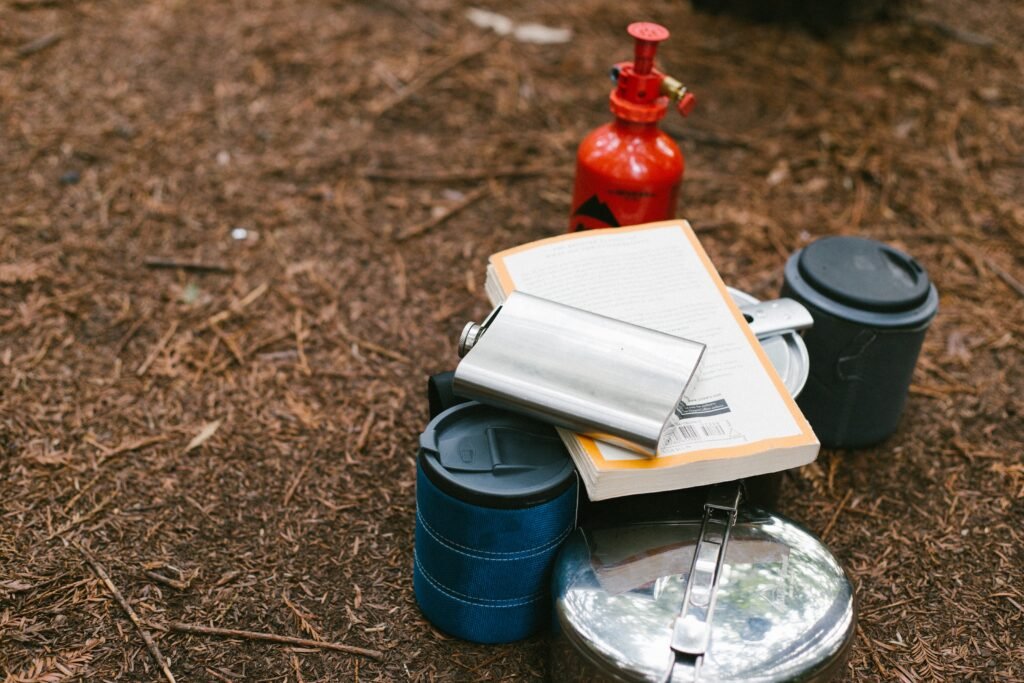
Safety and Navigation
Map and compass
When exploring unfamiliar areas, it’s essential to have a map and compass to navigate. Before your camping trip, study the map and plan your routes. Familiarize yourself with landmarks and key points of interest. Use your compass to orient yourself and stay on track while hiking or exploring.
Flashlight or headlamp
A reliable light source is essential for navigating your campsite in the dark. Pack a flashlight or headlamp, along with spare batteries, to ensure you can see clearly at night. This will also be useful for nighttime trips to the bathroom or if you need to search for something in the dark.
Extra batteries
To avoid running out of power for your portable electronics and light sources, bring extra batteries. Make sure to pack the appropriate sizes for your devices. Consider using rechargeable batteries to reduce waste and have a sustainable power solution.
Knife or multi-tool
A versatile tool is invaluable when camping. Pack a knife or multi-tool that includes various functions such as a blade, pliers, screwdriver, and scissors. This will come in handy for various tasks, from preparing food to fixing equipment or gear.
Whistle
A whistle is a simple yet effective tool for attracting attention and signaling for help in case of an emergency. Pack a whistle and keep it easily accessible, such as on a lanyard around your neck or attached to your backpack. Remember the safety rule of three blasts for SOS signaling.
Emergency contact information
In the event of an emergency, it’s important to have relevant contact information readily available. Write down emergency numbers, including local authorities and any emergency contacts, on a card that you keep with you at all times. This will ensure that you can quickly reach out for help if needed.
Extra cash and ID
While camping, it’s always a good idea to have some extra cash and identification with you. Keep a small amount of cash in case of emergencies or if you need to buy supplies or pay for unexpected fees. Carry your ID, such as a driver’s license or ID card, in case you need to provide identification.
Entertainment and Recreation
Books or magazines
Take advantage of the tranquility of nature by bringing along some books or magazines to read. Whether you enjoy a thrilling novel or prefer educational magazines, having reading material can enhance your relaxation and downtime during the camping trip.
Playing cards or board games
Bring some playing cards or board games to enjoy with your camping companions. They provide entertainment and bonding opportunities, especially during evenings or rainy days. Explore classic card games or bring along a favorite board game to enjoy together.
Fishing gear
If you enjoy fishing, pack your fishing gear to try your luck in the nearby waters. Bring along fishing rods, bait, hooks, and a fishing license if required. Fishing is not only a fun activity but can also provide you with a delicious meal if you catch something!
Binoculars
Nature offers plenty of wildlife and scenic views, so having a pair of binoculars can enhance your camping experience. Spot birds, observe wildlife, or simply admire stunning landscapes from a distance. Binoculars can bring the details of nature up close.
Camera and extra memory cards
Capture the memories of your camping trip by bringing a camera. Whether it’s a dedicated camera or your smartphone, having a way to document your adventures is important. Don’t forget to pack extra memory cards or ensure you have enough storage to capture all the special moments.
Musical instruments
If you’re musically inclined, consider bringing a portable musical instrument along. Playing an instrument can add an extra layer of enjoyment and entertainment around the campfire. Whether it’s a guitar, harmonica, or ukulele, music can create a wonderful atmosphere in the great outdoors.
Sports equipment
For those who enjoy active outdoor activities, bring along sports equipment that suits your interests. This could include items such as a frisbee, soccer ball, volleyball, or badminton set. Engaging in sports and games can keep you active and entertained while enjoying the beautiful surroundings.
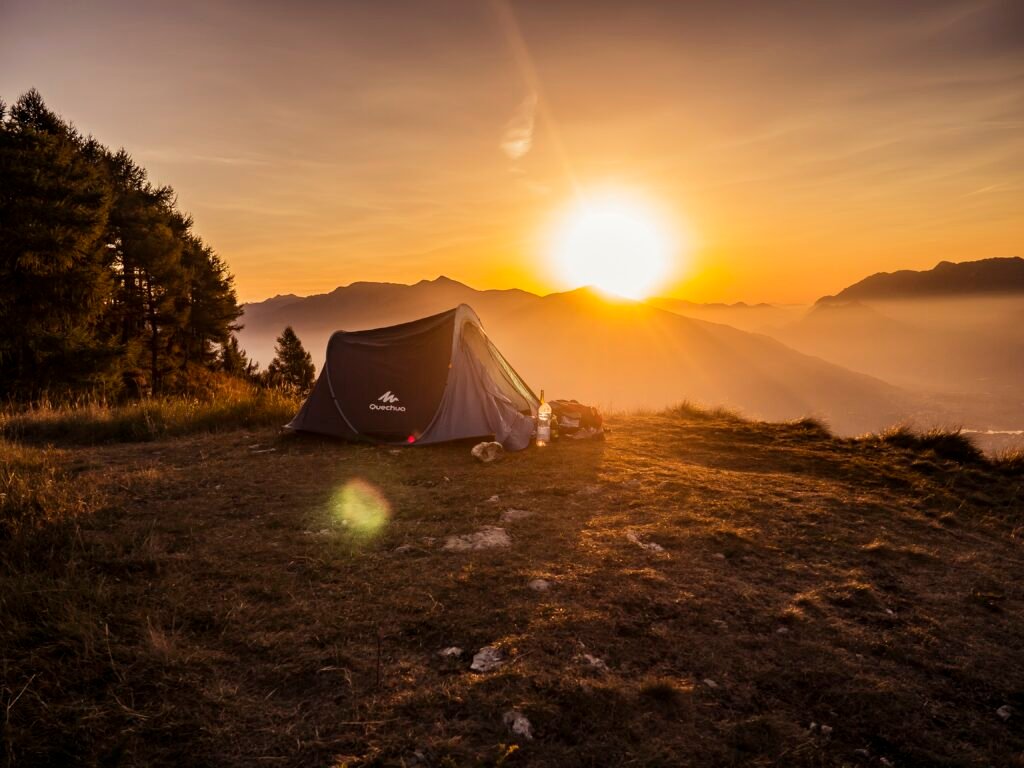
Campsite Essentials
Camp chairs or portable seating
Having comfortable seating at your campsite is essential for relaxation and socializing. Pack camp chairs or portable seating options that are lightweight and easy to transport. Look for chairs that are sturdy and durable, providing support and comfort during your camping trip.
Table or camp kitchen
A table or camp kitchen can make meal preparation and dining more organized and convenient. Look for a portable table that is easy to set up and provides a flat surface for cooking and dining. A camp kitchen can have storage compartments for utensils, condiments, and food preparation items, keeping everything organized and accessible.
Trash bags
Keeping your campsite clean and free from litter is crucial for maintaining the natural beauty of the environment. Pack plenty of trash bags to properly dispose of waste. Separate recyclables from regular trash and securely tie the bags to prevent animals from accessing them.
Dish soap and sponge
Properly clean your cooking utensils and dishes by bringing dish soap and a sponge. Choose environmentally friendly options and use biodegradable soap to minimize your impact on nature. Wash your dishes away from water sources to prevent contamination and practice Leave No Trace principles.
Campfire cooking grate
If you plan to cook over a campfire, a campfire cooking grate is a great addition to your camping gear. This allows you to grill food directly over the fire, adding an element of outdoor cooking to your meals. Look for a cooking grate that fits your campfire setup and is easy to clean.
Campfire tools and accessories
Having the right tools and accessories for your campfire can make it easier to build and maintain. Pack items such as fire starters, matches or a lighter, and firewood tools like tongs or a poker. These tools will help you safely build and tend to your campfire for warmth, cooking, and relaxation.
Miscellaneous
Cell phone and charger
Although camping is a chance to disconnect from technology, it’s important to have a cell phone with you in case of emergencies. Keep your cell phone fully charged and bring a portable charger to ensure you have a way to recharge if needed. Remember to use your phone responsibly and only when necessary.
Extra clothesline and clothespins
Bring along an extra clothesline and clothespins to hang wet clothes, towels, or other items that need to dry. This can be useful after a rainy day or if you’ve been swimming and need to dry off. Hang your clothes in a sunny and well-ventilated area to expedite the drying process.
Bug net or screen tent
To protect yourself from annoying mosquitoes and other insects, consider bringing a bug net or screen tent. These can be set up around your dining area or sleeping area to create a bug-free zone. This allows you to enjoy your meals or relax without constantly swatting away pesky bugs.
Portable camping toilet
For longer camping trips or areas without restroom facilities, a portable camping toilet can be a convenient solution. Look for portable toilets that are easy to set up and clean. Make sure to familiarize yourself with proper waste disposal procedures and follow all local regulations.
Camping shovel
A camping shovel is a versatile tool that can be used for various tasks. It can be used to dig a fire pit, clear away debris from your campsite, or dig a small hole for waste disposal if needed. Look for a compact and lightweight shovel that can be easily packed and carried.
Extra tent stakes and guy lines
Having extra tent stakes and guy lines can come in handy in case of emergencies or if any of your equipment gets damaged. Pack a few extra tent stakes and guy lines to ensure you can securely set up your tent or hammock. This provides added stability and helps protect against strong winds.
Duct tape
Duct tape is a useful item to have in your camping kit. It can be used for quick and temporary repairs on tents, sleeping bags, or other camping gear. Additionally, it can serve as a makeshift bandage or fixer-upper for various items. Pack a small roll of duct tape for unexpected situations.
Pets
Leash and collar
If you’re bringing your furry friend along on your camping trip, make sure to pack a leash and collar. Keeping your pet on a leash ensures their safety and prevents them from wandering off or approaching wildlife. It’s important to respect the rules and regulations of the campsite regarding pets.
Food and water bowls
Don’t forget to bring your pet’s food and water bowls. Pack enough food for the duration of your camping trip and store it in a secure container to prevent any unwanted animal visitors. Bring portable collapsible bowls for easy storage and feeding on the go.
Bed or blanket
Make your pet’s camping experience comfortable by bringing their own bed or blanket. This will provide them with a familiar scent and a cozy spot to rest after a day of outdoor activities. Having their own designated space can help keep them calm and relaxed in the camping environment.
Pet waste bags
Being a responsible pet owner means cleaning up after your pet. Pack plenty of pet waste bags to properly dispose of your pet’s waste. Remember to always pick up after your pet and properly dispose of the bags in designated trash receptacles.
Toys and treats
Keep your pet entertained during the camping trip by bringing their favorite toys and treats. This will provide them with mental stimulation and prevent them from getting bored. Interactive toys and treats can also help keep them occupied while you’re setting up camp or enjoying other activities.
Medical records and medications
Ensure your pet’s health and safety by bringing their medical records and any necessary medications. This includes vaccinations, proof of rabies vaccination, flea and tick prevention medication, and any prescribed medications. In case of an emergency, having this information readily available can be crucial for their well-being.
Identification tags
Make sure your pet has proper identification tags with up-to-date contact information. This includes your name, phone number, and the campsite location. In case your pet gets lost, having identification tags can increase the chances of a safe and speedy reunion.
Extras and Luxuries
Camping chairs with footrests
For added comfort and relaxation around the campsite, consider bringing camping chairs with footrests. These chairs allow you to kick back and elevate your feet, providing a more comfortable seating experience. Look for chairs that are lightweight, portable, and easy to set up.
Portable hammock
A portable hammock is a great way to relax and unwind in nature. Set it up between trees and enjoy the gentle swaying motion while reading a book or simply taking in the scenery. Look for hammocks that are lightweight and come with straps for easy setup.
Camping cot
For those who prefer a more elevated sleeping experience, a camping cot can be a great option. A camping cot provides a stable and comfortable surface to sleep on, keeping you elevated off the ground. Look for cots that are lightweight, foldable, and easy to transport.
Solar-powered charger
If you want to keep your electronic devices charged while camping, a solar-powered charger can be a sustainable and convenient option. These chargers use sunlight to generate power for your devices. Look for one that is compatible with your electronics and has a sufficient power capacity.
Portable shower
Bring the comforts of home with you by packing a portable shower. These devices allow you to shower in nature, providing a refreshing and convenient way to stay clean during your camping trip. Look for portable showers that are easy to set up and have a sufficient water capacity.
Outdoor projector
If you’re camping with a group and want to enjoy movie nights under the stars, consider bringing an outdoor projector. Set up a screen or project onto a white sheet, and enjoy your favorite films in a unique and memorable setting. Don’t forget to bring speakers or a portable sound system for a complete outdoor movie experience.
CO2 detector
Safety should always be a priority when camping. Consider investing in a carbon monoxide (CO2) detector to ensure your campsite is free from any dangerous gases. CO2 detectors can help alert you to potential hazards and provide peace of mind during your camping adventure.
By following this comprehensive packing guide, you will be well-equipped for a successful and enjoyable camping trip. Remember to tailor your packing list to your specific needs and the duration of your trip. Happy camping!


